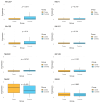Circulating microRNAs as Early Biomarkers of Colon Cancer: A Nested Case-Control Study Within a Prospective Cohort
- PMID: 40869212
- PMCID: PMC12386545
- DOI: 10.3390/ijms26167893
Circulating microRNAs as Early Biomarkers of Colon Cancer: A Nested Case-Control Study Within a Prospective Cohort
Abstract
Circulating microRNAs (miRNAs) have emerged as non-invasive biomarkers that may be associated with cancer risk, but their role in the development of colon cancer is still not well understood. We conducted a nested case-control study within the EPIC-Italy cohort to investigate the association between pre-diagnostic serum levels of eight candidate miRNAs (Let7, Mir21, Mir155, Mir181, Mir222, Mir145, Mir92, and Mir20) and subsequent colon cancer occurrence. A total of 104 incident colon cancer cases were matched to 104 controls by center, sex, age, recruitment date, and vital status. miRNA expression was quantified using RT-qPCR and normalized to Mir484. Logistic regression models were applied to estimate odds ratios, 95% confidence intervals, and p-values, adjusting for age at recruitment, smoking status, body mass index, physical activity, adherence to a Mediterranean diet, and socioeconomic position. Elevated expression of Let7 (OR = 0.91; 95% CI: 0.84-1.00; p = 0.04) was associated with slightly lower odds of colon cancer in unadjusted models. Mir21 and Mir222 showed borderline associations (p = 0.07 and p = 0.09, respectively), but these did not remain significant after Bonferroni correction. This result was consistent in the multivariate logistic model: higher levels of Let7 (OR = 0.91; 95% CI: 0.82-1.00; p = 0.06) and Mir222 (OR = 0.75; 95% CI: 0.57-1.00; p = 0.05) are suggestive of an association with lower odds of colon cancer. Our findings highlight the challenges of using circulating miRNAs as very early biomarkers, particularly when samples are collected nearly a decade before diagnosis. Future studies with larger sample sizes, serial blood collections, and integration with inflammatory and immune markers will be crucial to clarify the temporal dynamics of circulating miRNA alterations and their potential role in risk-adapted screening strategies.
Keywords: colon cancer; microRNA; nested case-control study.
Conflict of interest statement
The authors declare no conflicts of interest.
Figures

References
MeSH terms
Substances
Grants and funding
LinkOut - more resources
Full Text Sources

